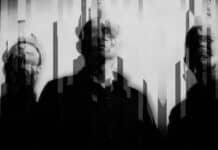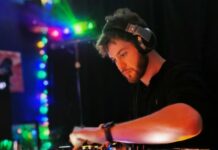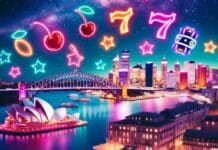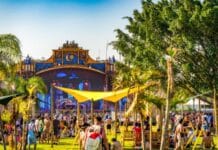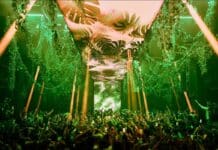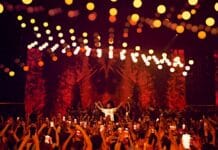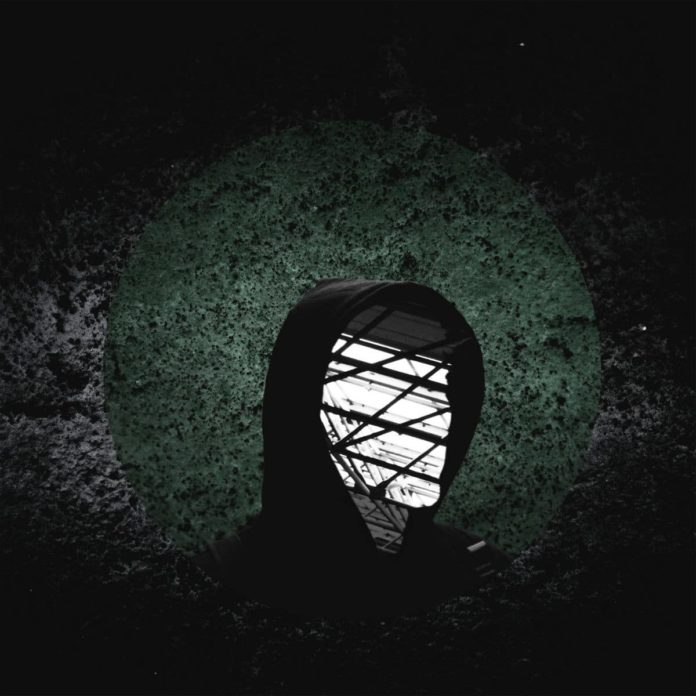
Solid electronic music and acoustic experimental manipulations from Moscow born musician Aleksandr Tresorg kicks off the releases for TruthTable, a new UK music label focusing on real analogue electronic music, beats and modular excursions.
We spoke to Aleks Tresorg to learn more about his album, and how does TruthTable stand out in a world that is over-saturated with albums.
T.H.E – Hey Aleksandr! Welcome to T.H.E – Music Essentials. How has 2019 kicked off for you?
Aleksandr Tresorg – Very exciting! My album is the first on TruthTable, so that’s a ton of responsibility. We’re getting lots of good feedback and it is turning out to be a very rewarding project. I’m also working on new music stuff and checking the mailbox every 5 minutes waiting for some new modular gear to arrive by post. Most of these are video synthesis related. instead of generating sounds, these modules, process and produce the analog video! A video signal from an old camera, for example, can be modified easily in many different ways making it unrecognizable. When combined with sound, real-time visualizations that react to music are the outcome. These visuals are sometimes very psychedelic and full of texture similar to static TV noise. Creating an audiovisual project is hard work, so hopefully, I can show this soon to a live crowd!
T.H.E – Your new album sounds fresh and kicks off the release schedule for TruthTable – a new UK music label focusing on real analogue electronic music, beats, and modular excursions. Why did you decide to release the album on it?
Aleksandr Tresorg – I was going to self-release this album as it was approaching the finish line, and then I received an email from David through the hyperreal mailing list which caught my eye. The vision of TruthTable seemed like a great fit for my work so I got in touch and he was really encouraging about my work. TruthTable is based in Sheffield, the original home of Warp records, seemed like a great opportunity to get my music heard by people that are from the same scene. Bilbao, where I live, the electronic scene is up-and-coming, and we have some great collectives, but it is more of a “Rock” city. David’s focus on electronic instruments seemed important to me as I’m a hardware freak, always looking for different ways to patch & route signals. For me, looking away from the screen when making music brings me closer to the essence of it all, it feels different.
T.H.E – How was it working with them?
Aleksandr Tresorg – All positive! David did a really good job at curating and mastering the final album, I’m really grateful for that, I haven’t heard my music sound so good before! Hopefully, I will release again on TruthTable!
T.H.E – Given that the market is over-saturated with record labels – how does TruthTable stand out, with its focus on real analogue electronic music?
Aleksandr Tresorg – Making music on a PC is relatively easy nowadays, we’ve got software that can write your music with minimal input from the creator. I strongly believe it is important to hold onto the old arts. Real electronic music is about plugs, wires, midi cables and mixing desks channeling inputs from analogue electronic instruments. TruthTable is about supporting artists who are still using the hardware synths, drum machines and modular networks – electricity and circuits being brought expertly together by the artist. You’ve got to live and breathe these machines to get the best out of them – but the results are worth it. Don’t get me wrong – I do love software applications too but the outputs of analogue hardware bring a special quality to the sound.
T.H.E – Tell us a bit about the album, what is the message behind its title.
Aleksandr Tresorg – I think consumerism, mainstream media and major labels that make products out of artists are responsible for the over saturation of disposable music that we have right now. These are the “Heroes” in the title. The triangular shape represents the cover of “Dark Side of the Moon” by Pink Floyd, making a reference to the first song on the B side, “Money”, which criticizes Consumerism. The slightly tilted triangle itself depicts a disintegrating pyramid, referring to the past which is no longer. I think the title ties all that together with the dark pulsing dub techno interspersed with experimental sounds and grooves that are at times “spaced out”. Feedback is that DJ’s and reviewers who have got hold of the album were reminded of Gescom, Machinedrum, Skam, and Merck!
T.H.E – The album was supposedly in the works for over 4 years. What were some of the most difficult challenges you faced?
Aleksandr Tresorg – There were many songs I did over that time that didn’t make it onto the album. Working with the label we picked just the “right ones” that would sit well. Each track is like a reflection of a point in time from my life. Some songs sit unfinished for a long time until I get back to them and add the last touch or remix it completely. So probably the hard part is just waiting for the right time and getting the necessary inspiration to make it a finished track.
T.H.E – When you started working on the album, were you clear about creating an album, or did it happen along the way?
Aleksandr Tresorg – I like the idea of releasing music in an album format. I think you can tell more to the audience in a collection of pieces what you want to transmit to them. So yes, when I finished my last album Iraphoniks the first thing I did the next day started working on the next one!
T.H.E – As part of your career, you are also a software developer. How has that played a role in your journey as a music producer?
Aleksandr Tresorg – There is a great book on architecture from the 70s, “A Pattern Language”, it exposes patterns/solutions on how to build cities, suburbs, living spaces. That was precedence to Software Design Patterns which are used in all working software today and basically help you solve all the common programming problems. Music in many ways is similar, you have to know the “patterns” and use them to solve your music piece. So, for me, making music is related to developing a solid architecture that “holds” when the pieces are put together. Developing software also opened the doors for me to making interactive installations for expos and performances, live-coding, generative music, VST programming… I think being able to write your own applications that are oriented towards music is a really useful tool.
T.H.E – Which tracks from the album are your favourite, and why?
Aleksandr Tresorg – My preferred is short and sweet …lenergy. I wrote that the day we found out we were expecting a daughter, she is 2 years old now.
T.H.E – Lastly, what are your plans for the rest of 2019?
Aleksandr Tresorg – I’m working on a VST with David for Audiobulb, more news on that sometime this year! Some live hard-techno gigs with my other project Dvoinoi, it will be the first time we will be doing live analogue video synthesis, so we are working very hard there. Some possibilities of composing music for film as Lowveld. And writing more music!!!



